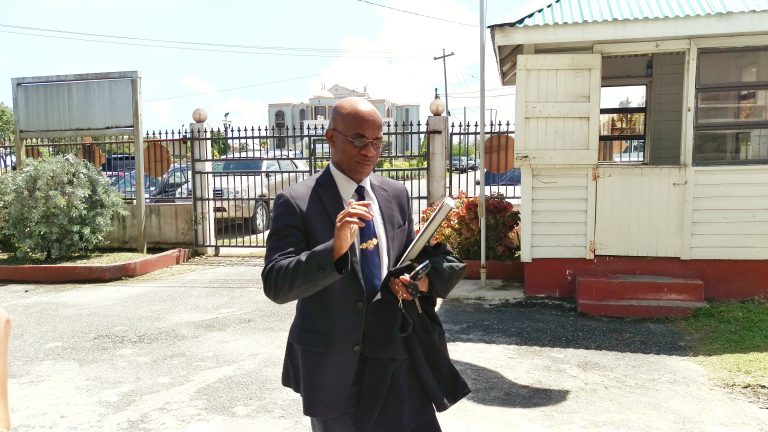In last Sunday’s ruling in Guyana’s Appellate Court, Justice Brassington Reynolds voted to reverse the High Court’s ruling that threw out APNU’s motion to block Gecom from recounting the ballots of the March 2 general elections. He wanted to send the matter to a lower court presided over by an APNU affiliated judge (Franklyn Holder) so he can make an order to prevent Gecom from recounting ballots. The High Court ruled that the court has no jurisdiction to stop Gecom, an independent constitutional agency, from carrying out a recount of ballots. The law clearly states that the court cannot stop Gecom from doing a count or a recount of ballots. Yet Justice Reynolds dissented in the Appellate Court’s verdict. The other two judges, Dawn Gregory Barnes and Rishi Persaud, voted to throw out the appeal ruling indicating that Gecom has authority to recount ballots.
Why did Justice Reynolds vote the way he did? Before the ruling, questions were raised about his impartiality and integrity in matters pertaining to the APNU led government. He is the subject of several conflicts of interest relating to the government. Questions were raised on whether he can be trusted to deliver a fair ruling given his conflicts of interests? Some questions were also raised on whether instructions would have been given to him how to rule. Worse, it was even suggested his judgment would be written for him and all he had to do was to read it in the court. Does Justice Reynolds really believe that a court can stop Gecom from recounting votes? If the matter were to be taken to the CCJ, he would be embarrassed. The court would rebuke him.
It was felt by those who know the Judge Brassington well that he would vote to throw out the appeal. They turned out to be wrong and are disappointed at his ruling. But why did Reynolds vote the way he did?Reynolds has had a domestic affair with APNU Minister Nicolette Henry (that produced a child). Reynolds and Henry were military squaddies together in the army. They were trained under Granger who promoted both to higher positions. Justice Reynolds owns a transport business that gets contracts from the government. Wasn’t/isn’t Reynolds concerned about these conflicts? Why didn’t he recuse himself from the case? Was he not concerned how people would view these conflicts of interests and that they would conclude that his ruling would be compromised?
Why was Reynolds chosen for this appeal? He is a criminal court judge. He is not schooled in constitutional law and he never heard a constitutional matter. He was plucked straight from the High Court to partake in this appeal matter. There was Justice Navindra Singh who could have been asked to preside over the appeal. Was he not selected because of his race? And why didn’t Chancellor Yonette Cummings preside over the appeal herself? Was it that she did not want to be embarrassed on following instructions how to vote or to have an APNU affiliated lawyer to write a judgment for her to read? Justices Yonette Cummings and Dawn Gregory have been subjects of ridicule in Guyana, around the Caribbean and the globe in that infamous ruling that 33 is not a majority of 65. Justice Dawn has been put on the Gecom appeal matter to face the pressure from her masters on how to rule. Yonette did not want to be a party to that mess. Justice Dawn had an opportunity to redeem her reputation in the case. She used it to cast away the ghost of the no confidence ruling that continued to haunt her judgments. The world was watching her. She had to rule fairly. The language of the constitution is pellucid that the court has no jurisdiction to stop Gecom from carrying out a recount. Were she to rule otherwise, she would once again be a laughing stock.
Was Dawn Gregory Barnes given instructions on how to vote or rule in the appeal? Did she decline the instruction? Was a judgment written for her by an APNU lawyer to read? Did she decide to reject that pre-written judgment to preserve a modicum of integrity and proceeded to rule on the appeal based on the law?
Justice Rishi Persaud is well regarded for his integrity and the country knows that he would not sell his soul even if threatened or pressured with incentives.
The substantive issue before the appellate court is whether a high court has the jurisdiction to and whether it can stop Gecom from recounting of votes. Gecom is an independent institution. It has been given constitutional powers to oversee the elections. Article 162 says Gecom has a right to count the ballots; it approved a recount before the matter was taken to the High Court. After that matter was discharged from the High Court, Gecom voted again to do a recount. It would be improper for the Appeal Court to collude with those who unlawfully wished to derail the process for a fair and impartial recount of votes for the good of Guyana. The Appeal court could not and must not interfere with the process for a recount.
The court cannot stop Gecom from carrying out its mandate to recount ballots. The court can offer supervisory guidance for Gecom to follow the law and to abide by the CJ’s ruling to count the SOPs transparently in public. The court can offer interpretations of the law and exercise some supervisory role to make sure Gecom follow the law but the court cannot a recount unless it is fraudulent. The court can instruct Gecom on procedures for a fair count.Justice Dawn Gregory Barnes ruled wisely to prevent tarnishing of the image of Guyana’s court that once ruled that 33 were not a majority of 65. Justice Dawn has redeemed some respect. She has salvaged some respect. Justice Reynolds, on the other hand, has seen his integrity thrown out the window.
